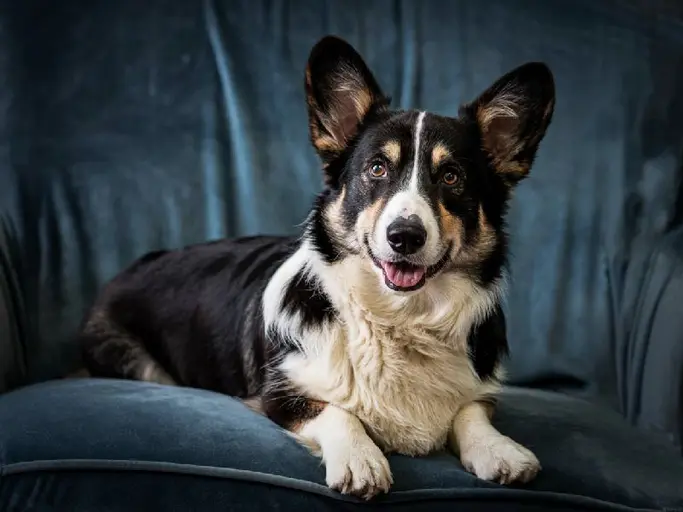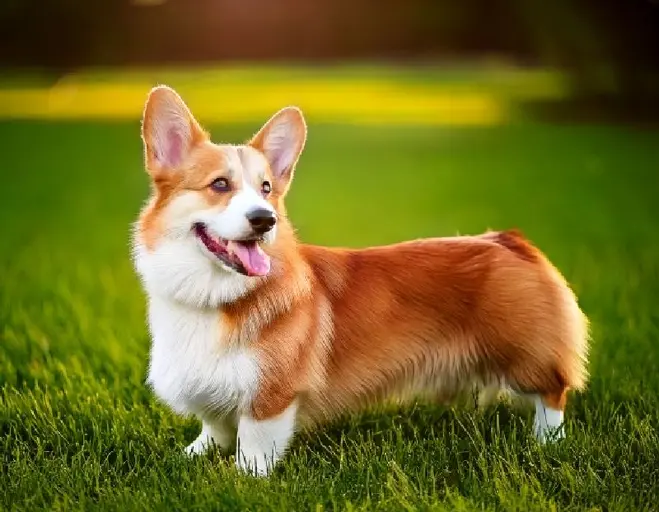The Cardigan Welsh Corgi: A Comprehensive Breed Guide

Brief Introduction to the Cardigan Welsh Corgi
The Cardigan Welsh Corgi is a distinctive and charming breed, instantly recognizable by its low stature, expressive face, and sturdy build. Unlike its more popular cousin, the Pembroke Welsh Corgi, the Cardigan boasts a long tail – one of the key distinguishing features between the two. This intelligent and affectionate breed, with its signature “elfin saddle” markings, has captured the hearts of dog lovers worldwide. What makes the Cardigan Welsh Corgi particularly attractive is its friendly disposition, loyal nature, and its ability to adapt to various lifestyles, from apartment living to farm life, provided they receive adequate exercise and mental stimulation. They are also known for being excellent watchdogs, alerting their families to anything out of the ordinary.
Breed History of the Cardigan Welsh Corgi
Origins and Ancestry
The Cardigan Welsh Corgi is one of the oldest herding breeds, tracing its roots back over 3,000 years to the Teckel family of dogs. These dogs were brought to Wales by the Celts around 1200 BC. The breed’s name comes from Cardiganshire in Wales, where they served as versatile farm dogs. They are thought to be related to breeds like the Dachshund and the Basset Hound, which explains their similar body shape.
Role in the Past
Historically, the Cardigan Welsh Corgi was an invaluable asset to Welsh farmers. Their primary role was that of a herding dog, driving cattle and sheep to pasture. Their short legs allowed them to nip at the heels of livestock without being kicked. They also served as guardians, protecting the farm from predators and alerting their owners to any potential threats. Furthermore, they were excellent vermin hunters, keeping the rodent population under control. Their versatility made them indispensable members of the farming community.
Breed Development
Over the centuries, the Cardigan Welsh Corgi evolved to suit the specific needs of Welsh farmers. Through selective breeding, farmers honed the breed’s herding instincts, intelligence, and sturdiness. While the Pembroke and Cardigan Corgis were initially bred together, their differences were eventually recognized, leading to their separate classification. The Cardigan Welsh Corgi was officially recognized by the Kennel Club in 1925, solidifying its status as a distinct breed.
Appearance of the Cardigan Welsh Corgi
Size and Proportions
- Height: Typically 10.5 to 12.5 inches at the shoulder.
- Weight: Generally ranges from 25 to 38 pounds, depending on sex and build. The Cardigan Welsh Corgi is a long and low-set dog with a deep chest and sturdy bone structure. Their overall appearance is one of strength and endurance.
Coat and Color
The breed has a double coat:
- A short, dense undercoat that provides insulation.
- A longer, coarser outer coat that protects against the elements.
Acceptable coat colors include:
- Red
- Sable
- Brindle
- Black
- Blue Merle
White markings are common on the chest, legs, muzzle, and tail tip. The distinctive “elfin saddle” markings, often seen in a contrasting color over the back, are a hallmark of the breed.
Head and Facial Features
The head is fox-like in shape, with a slightly domed skull and a moderate stop.
- Ears: Large, erect, and slightly rounded at the tips.
- Eyes: Medium-sized, dark (preferably brown), and set wide apart. They have a gentle, intelligent expression.
- Muzzle: Moderately long and tapering, with a black nose.
Tail
Unlike the Pembroke Welsh Corgi, the Cardigan Welsh Corgi has a long tail, set low and carried naturally. It should reach to the hock joint and may be carried slightly raised when the dog is excited or alert.
Character and Behavior of the Cardigan Welsh Corgi
Temperament
Cardigan Welsh Corgis are known for their intelligence, affection, and loyalty. They are generally friendly and outgoing, but can be reserved with strangers until they feel comfortable. They are also alert watchdogs, quick to bark at anything unusual.
Attitude Towards People
These dogs are typically very affectionate with their families and enjoy being involved in all aspects of family life. They are known for their playful nature and their ability to bond closely with their owners. Early socialization is important to ensure they are comfortable around a variety of people.
Interaction with Children
Cardigan Welsh Corgis can be good with children, especially when raised with them from a young age. However, due to their herding instincts, they may be inclined to nip at the heels of running children. It is crucial to teach children how to interact respectfully with dogs and to supervise interactions, particularly with young children.
Attitude Towards Other Animals
With proper socialization, Cardigan Welsh Corgis can coexist peacefully with other dogs and cats. However, their herding instincts may lead them to chase or herd other animals. Early and consistent training is essential to manage these instincts.
Activity Level
Despite their short legs, Cardigan Welsh Corgis are surprisingly energetic. They require regular exercise to stay physically and mentally healthy. Daily walks, playtime in the yard, and interactive training sessions are all important. While they can adapt to apartment living, they thrive when they have access to a yard or open space where they can run and play.
Trainability
Cardigan Welsh Corgis are highly intelligent and eager to please, making them relatively easy to train. They respond well to positive reinforcement methods, such as treats, praise, and toys. Consistency is key, and it is important to start training early.
Breed Characteristics
- Intelligence: Highly intelligent and quick learners.
- Loyalty: Extremely loyal and devoted to their families.
- Alertness: Excellent watchdogs, always on the alert.
- Playfulness: Retain their playful nature well into adulthood.
- Independence: Can be independent thinkers, requiring consistent training.

Care and Maintenance of the Cardigan Welsh Corgi
Grooming
The Cardigan Welsh Corgi has a relatively low-maintenance coat. Regular brushing, about once or twice a week, is sufficient to remove loose hair and prevent matting. During shedding season (typically spring and fall), more frequent brushing may be necessary. Bathing should only be done as needed, as excessive bathing can strip the coat of its natural oils.
- They do not require professional haircuts.
- Regular nail trimming is essential to prevent overgrowth.
Exercise
Cardigan Welsh Corgis need regular exercise to stay healthy and happy. Aim for at least 30-60 minutes of exercise per day, which can include:
- Daily walks.
- Playtime in the yard.
- Interactive games, such as fetch or tug-of-war.
- Herding activities (if available).
They also enjoy mental stimulation, such as puzzle toys or training sessions.
Feeding
A high-quality dog food, appropriate for their age, size, and activity level, is essential. It is important to monitor their weight and adjust their food intake accordingly to prevent obesity, which can exacerbate their predisposition to certain health problems.
- Avoid overfeeding and limit treats.
- Provide fresh water at all times.
Health
Cardigan Welsh Corgis are generally healthy dogs, but they are prone to certain health problems, including:
- Progressive Retinal Atrophy (PRA): A degenerative eye disease that can lead to blindness.
- Intervertebral Disc Disease (IVDD): A spinal condition that can cause pain, weakness, and paralysis.
- Hip Dysplasia: A malformation of the hip joint that can lead to arthritis.
- Elbow Dysplasia: Similar to hip dysplasia, but affecting the elbow joint.
- Degenerative Myelopathy (DM): A progressive neurological disease that affects the spinal cord.
Regular veterinary checkups are crucial for early detection and management of these health problems. Reputable breeders screen their dogs for these conditions, so it is essential to choose a responsible breeder.
Possible Health Problems
As mentioned above, IVDD is a significant concern for Cardigan Welsh Corgis due to their long backs and short legs. Maintaining a healthy weight and avoiding activities that put excessive strain on their backs can help reduce the risk. Regular exercise and a balanced diet are important for overall health and longevity.
Breed Weaknesses of the Cardigan Welsh Corgi
Tendency Towards Barking
Cardigan Welsh Corgis are natural watchdogs, which means they are prone to barking. While this can be a desirable trait for some owners, it can be problematic for others, especially those living in apartments or close proximity to neighbors. Training can help manage excessive barking, but it is important to be aware of this tendency.
Potential for Weight Gain
Cardigan Welsh Corgis are prone to weight gain, especially as they get older. Obesity can exacerbate their predisposition to IVDD and other health problems. It is crucial to monitor their weight and adjust their food intake and exercise levels accordingly.
Independent Nature
While they are eager to please, Cardigan Welsh Corgis can also be independent thinkers. This can make training challenging at times, requiring patience and consistency. Early socialization and training are essential to develop good manners and prevent behavioral problems.
Loyalty
Cardigan Welsh Corgis are extremely loyal dogs, however, this means that they can potentially be overprotective of their families, which may lead to unwanted guarding behaviors. Early socialization with various people and animals is essential to prevent such guarding behaviors.
Conclusion: Is the Cardigan Welsh Corgi Right for You?
The Cardigan Welsh Corgi is a wonderful breed for the right owner. They are intelligent, affectionate, and loyal companions who thrive in a variety of environments. They are best suited for individuals or families who are willing to provide them with regular exercise, mental stimulation, and consistent training. They make excellent watchdogs and are generally good with children and other animals, provided they are properly socialized. If you are looking for a versatile and loving companion with a distinctive appearance and a big personality, the Cardigan Welsh Corgi may be the perfect breed for you. However, it is important to be aware of their potential health problems and their tendency towards barking and weight gain. Careful consideration and responsible ownership are essential for ensuring a happy and healthy life for both you and your Cardigan Welsh Corgi.
Frequently Asked Questions About Cardigan Welsh Corgi
-
What is the main difference between a Cardigan Welsh Corgi and a Pembroke Welsh Corgi?
The most notable difference is the tail. Cardigan Welsh Corgis have long tails, while Pembroke Welsh Corgis typically have naturally bobbed or docked tails.
-
Are Cardigan Welsh Corgis good with children?
Yes, Cardigan Welsh Corgis can be good with children, especially when raised with them from a young age. However, due to their herding instincts, they may nip at heels, so supervision and proper training are important.
-
How much exercise does a Cardigan Welsh Corgi need?
Cardigan Welsh Corgis need at least 30-60 minutes of exercise per day, including walks, playtime, and mental stimulation.
-
Do Cardigan Welsh Corgis bark a lot?
Yes, Cardigan Welsh Corgis are natural watchdogs and tend to bark. Training can help manage excessive barking.
-
What are some common health problems in Cardigan Welsh Corgis?
Common health problems include Progressive Retinal Atrophy (PRA), Intervertebral Disc Disease (IVDD), Hip Dysplasia, and Degenerative Myelopathy (DM).
-
Are Cardigan Welsh Corgis easy to train?
Cardigan Welsh Corgis are intelligent and eager to please, making them relatively easy to train with positive reinforcement methods. Consistency is key.
-
How often do Cardigan Welsh Corgis need to be groomed?
Regular brushing, about once or twice a week, is sufficient. During shedding season, more frequent brushing may be needed. Bathing should be done as needed.
-
Are Cardigan Welsh Corgis good with other dogs?
With proper socialization, Cardigan Welsh Corgis can coexist peacefully with other dogs. Early and consistent training is essential.
-
What is the average weight of a Cardigan Welsh Corgi?
The average weight ranges from 25 to 38 pounds, depending on sex and build.
-
What type of environment is best suited for a Cardigan Welsh Corgi?
While they can adapt to apartment living, they thrive when they have access to a yard or open space where they can run and play. Regular exercise and mental stimulation are crucial.

